Dirty Jersey Roller Derby rolls into the community collecting food pantry donations to participating in parades
By Kathy Chang
It’s 8 p.m. on a Thursday night. The ladies of Dirty Jersey Roller Derby – Play Clean, Skate Dirty – are gathering at South Amboy Arena Roller Magic gearing up for a two-hour practice.
Many chatter as they put on their gear – Knee pads. Check. Elbow pads. Check. Helmet. Check. Mouth Guard. Check. Roller skates. Check.
A blow of a whistle by Clare Higgens, head coach and vice president of the team, disperses the chatter. The ladies make their way onto the rink to begin a warmup.
As the warmup begins, the sound of multiple roller skates rolling and squeaking on the hardwood rink floor is almost deafening.
“[Roller derby] is something that has been around for many, many years,” said a longtime member of Dirty Jersey Roller Derby (DJRD). “It was seen on TV. Some say, ‘Oh I remember when it was on TV Saturday mornings in the 1970s.’ In the 2000s, a new generation spread [the sport] across the country.”
The origins of roller derby date back to the 1930s and 1940. It is an international sport, mostly played by amateurs. It was under consideration as a roller sport for the 2020 Summer Olympics, according to the history of the sport.
DJRD is a Women’s Flat Track Roller Derby league founded in 2015 with about 10 members – not even a full roster.
“It was very gutsy to try to get this going,” recalled Dr. Babe, noting many at the time were part of a different team and came together to form DJRD.
The league was created with dedication not only to the sport, but to each of the members and the community. DJRD was founded by skaters with the mission to empower each and every skater while having fun and giving back to the community, according to its website.
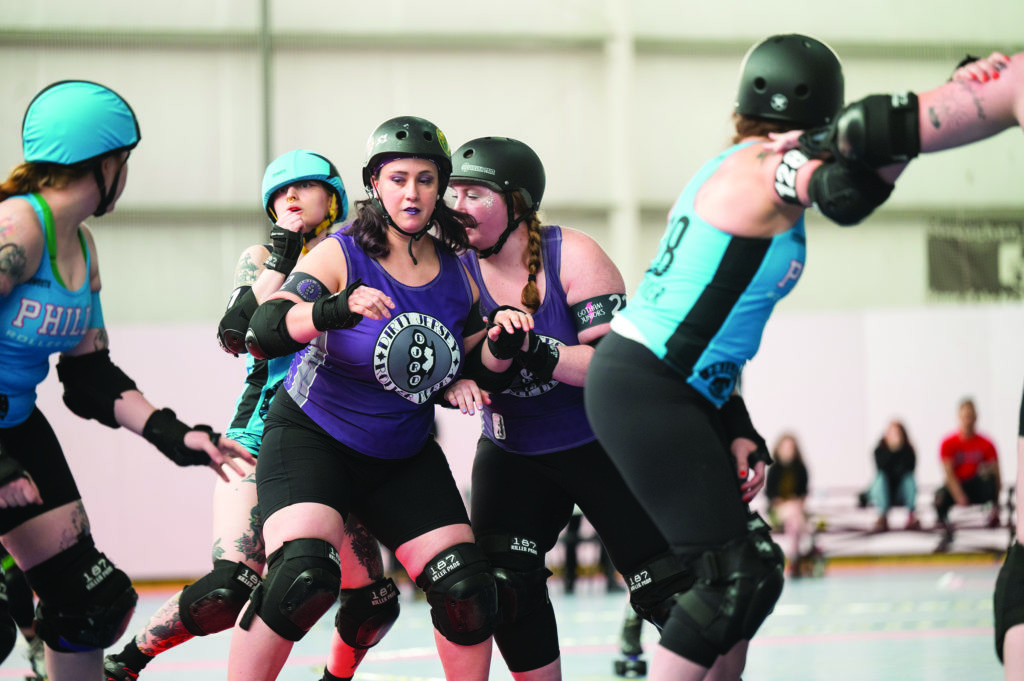
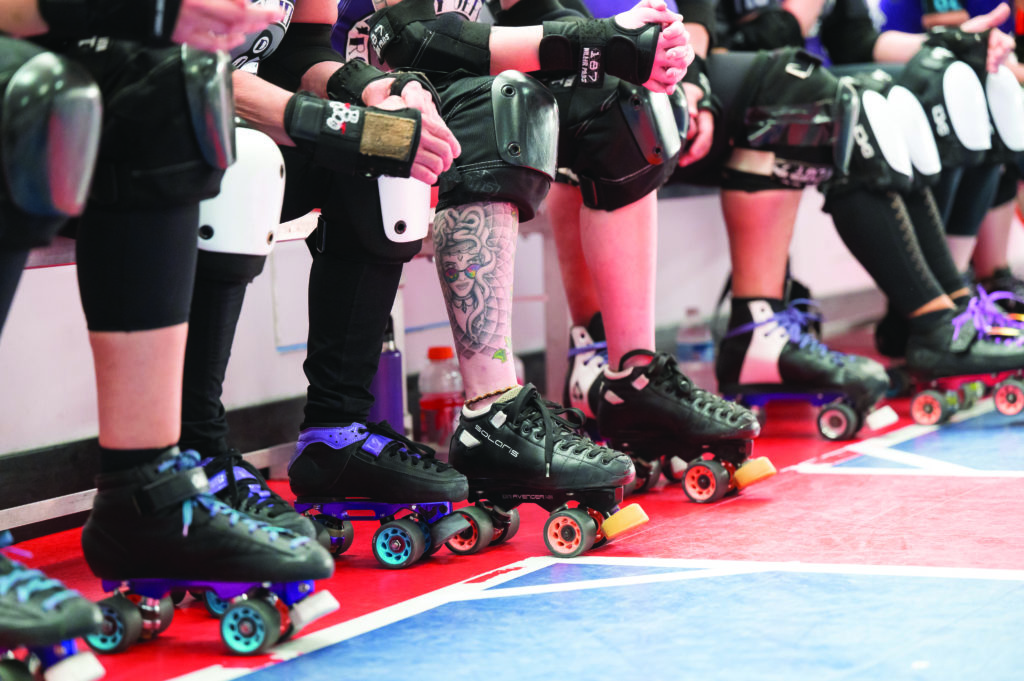
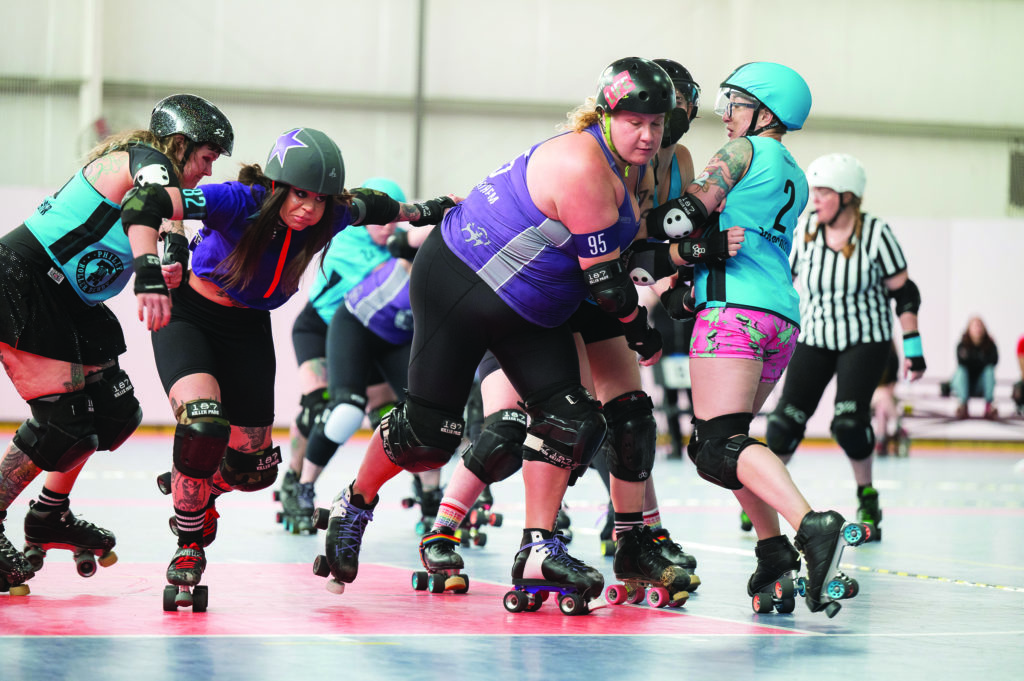
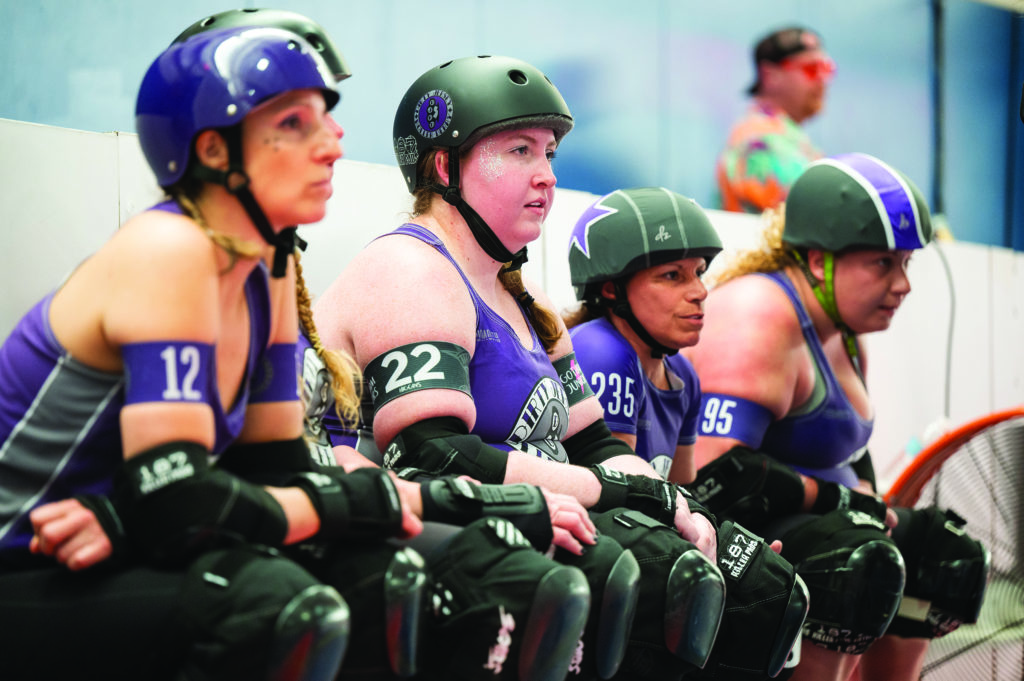
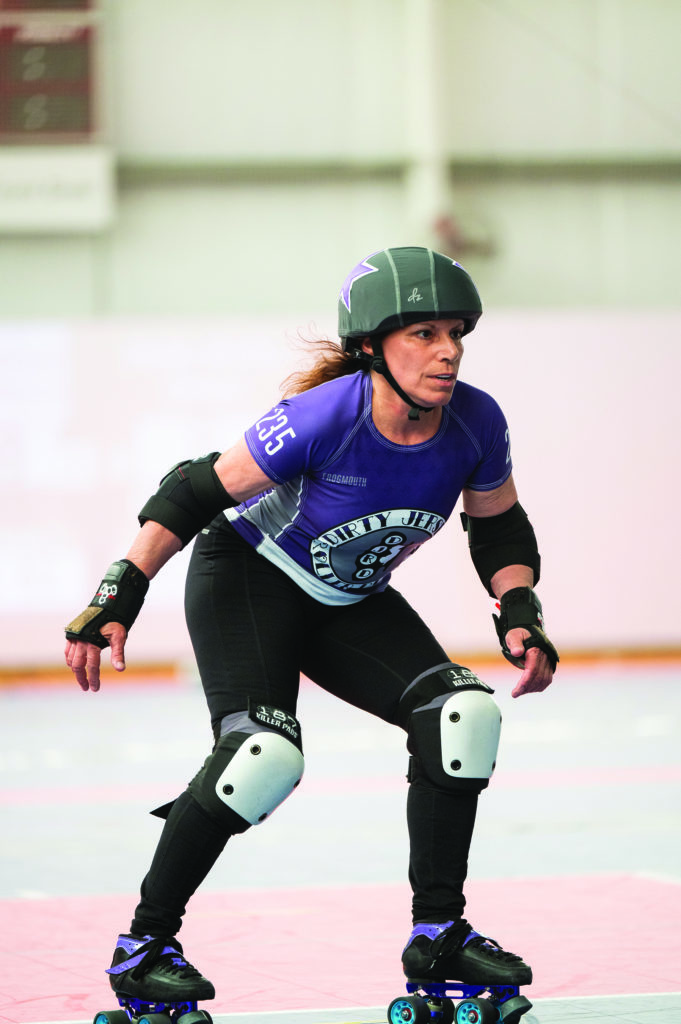
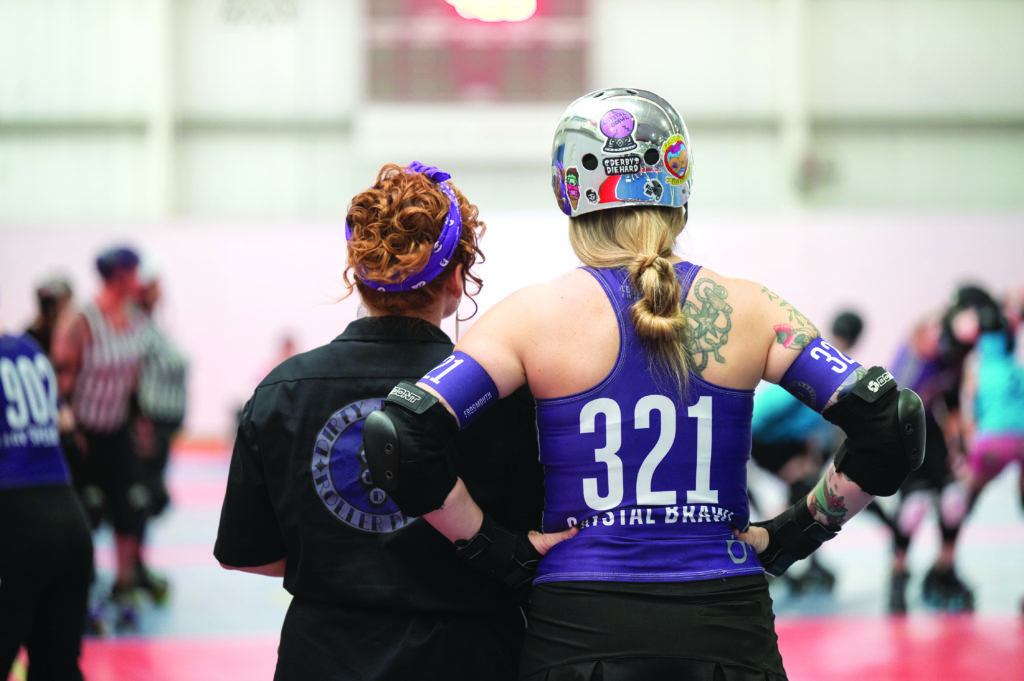
The team follows the rules and regulations of the Women’s Flat Track Derby Association (WFTDA), the international governing body for the sport of women’s flat track roller derby and a membership organization for leagues to collaborate and network.
According to WFTDA, there are 427 WFTDA member leagues on six continents.
DJRD plays other WFTDA teams across the tri-state area in New Jersey, Delaware, Pennsylvania, Connecticut and New York.
During a typical DJRD two-hour practice, which is held on Tuesdays and Thursdays, the team practices skill drills and plays practice scrimmages.
The derby game is a fast-paced point system game. It’s literally two-minute spurts or jams as they call it with a lot going on. Each team typically has a roster of 15. During a jam, there are two teams on the oval track. Each team has five skaters – four blockers and one jammer who is wearing a star.
During a game, each jammer is trying to get through the blockers and once a jammer gets through the pack, they are considered a lead jammer, who can essentially call the shots. Once the lead jammer makes it around the track one full round, then the jammer can start to accrue points each time they get around the track. The lead jammer can call the jam anytime or if they feel they can continue to be lead jammer, they could essentially keep going up to two minutes to gain even more points.
All this happens in mere seconds and the jammer must make those split-second decisions. That is why communication is key among players. But with the almost deafening sounds of the game, It’s hard sometimes.
Each member has a name and number unique to them whether it is a child’s birthday or a favorite book. And believe it or not, some only know each other by their Derby name. Hence the unique and crazy nicknames in this article.
“We get to pretend to be that person,” member Crystal Brawl No. 321 said. “Then after, we go back to regular life. People at the supermarket would never figure.”
Unless they happen to see you go to supermarket after practice or a game like Bones No. 814.
“You kinda stink and your face is doing a lot,” Bones said with a laugh, noting the extreme war paint makeup and fishnet get up that some wear.
Like everything, the COVID-19 pandemic hurt the team. Roller derby is a full-on contact sport and was the first to enter the abyss of the unknown. After the initial lockdown, some teams came back, some did not.
For the ladies of the DJRD, they were excited to come back. It has grown to about 30 dedicated members.
DJRD is split among an All-Star team and a B team. Some members play on both teams.
Every year, the team holds a six-week boot camp on Sundays for those interested in joining the team. This year, the bootcamp ran from April 30 to June 4 from 10 a.m. to 1 p.m. at Fords Park on King Georges Road in Woodbridge.
There’s no need to have any skating experience. The team walks a newbie through the fundamentals of moving on skates, falling on skates to the rules of the derby game.
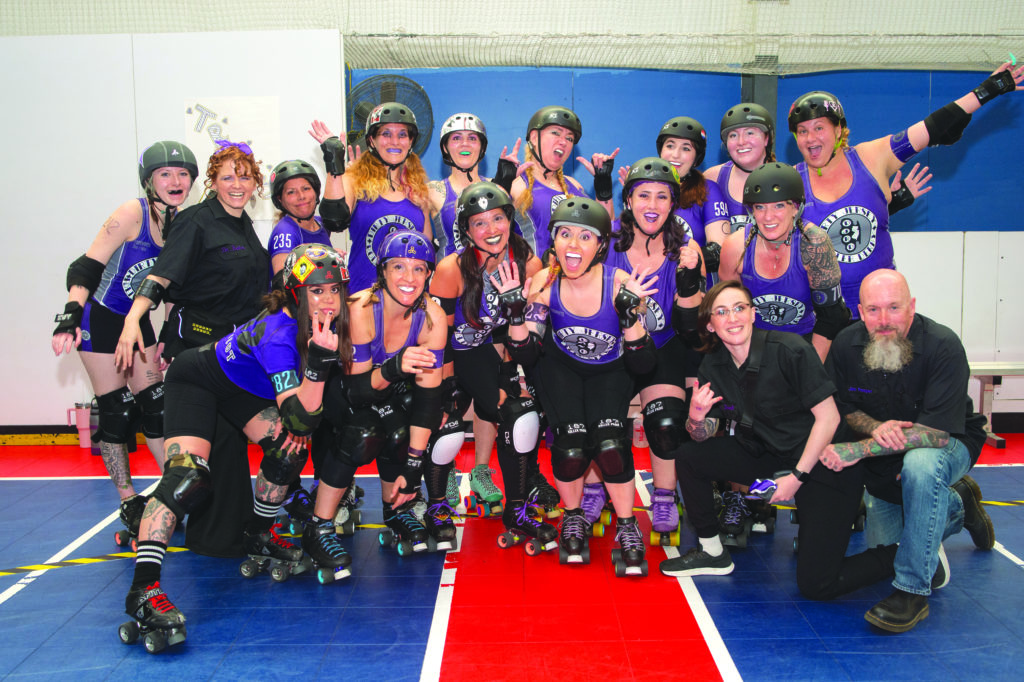
Many times, the team pools old gear for those who want to give the sport a try.
For veteran skaters, it’s incredible to watch someone who has never skated before to someone playing in a full-blown derby game months later.
Crystal Brawl, of Spotswood, joined DJRD through boot camp last year.
“I did it because I’m a mom,” she said. “I kind of lost myself in my household and my husband and kids.”
During the pandemic lockdown, Crystal Brawl, who has always liked roller and trail skating, said she would roller skate in her house and neighborhood.
In a whim, she reached out to local roller derby teams and DJRD was the first to answer. At the time, the team’s boot camp 2022 was set to start in three weeks. Crystal Brawl showed up super scared, but excited at the same time.
“It’s just kind of a place to come together and get your aggression out,” she said.
Bones, of Marlboro, has been with the team since its inception. And if you ask her why she joined the team and came back for more? Her simple reply is because “it’s fun”
“Honestly, I got involved because the ad when I originally started was like, ‘Hey do you want to get some exercise for free, make new friends?’ Yeah why not?” Bones recalled. “I don’t run, I’m not a runner. I know a lot of people don’t like to do traditional exercise.”
Roller Derby is not your typical traditional exercise. It’s a sport that you do have to keep your endurance up so the team will weightlift, but if Bones hasn’t reminded you yet, the game is “fun.”
“Everybody on this team is just awesome and has become like a family,” she said. “It’s a place you get to hit people and it’s OK. It’s hard not to say ‘Sorry’ for a while at first, but it’s part of the game. It takes a while to get the hang of, but it’s fun, it’s fun to do, it’s fun to watch.”
Bones said her son is getting into the game now and may join a junior’s team.
To be on DJRD, a person must be 18 years old. That’s it. The beauty of roller derby is the super inclusive nature of the sport. If you have the drive and you want to play a particular position, there’s no barrier stopping you.
The DJRD roster runs the gamut of ages 19 to upwards of 50 plus. And from literally all professional walks of life – health care and accounting to librarians and teachers.
Many DJRD members come from the Central Jersey area, but some members are from northern and southern New Jersey.
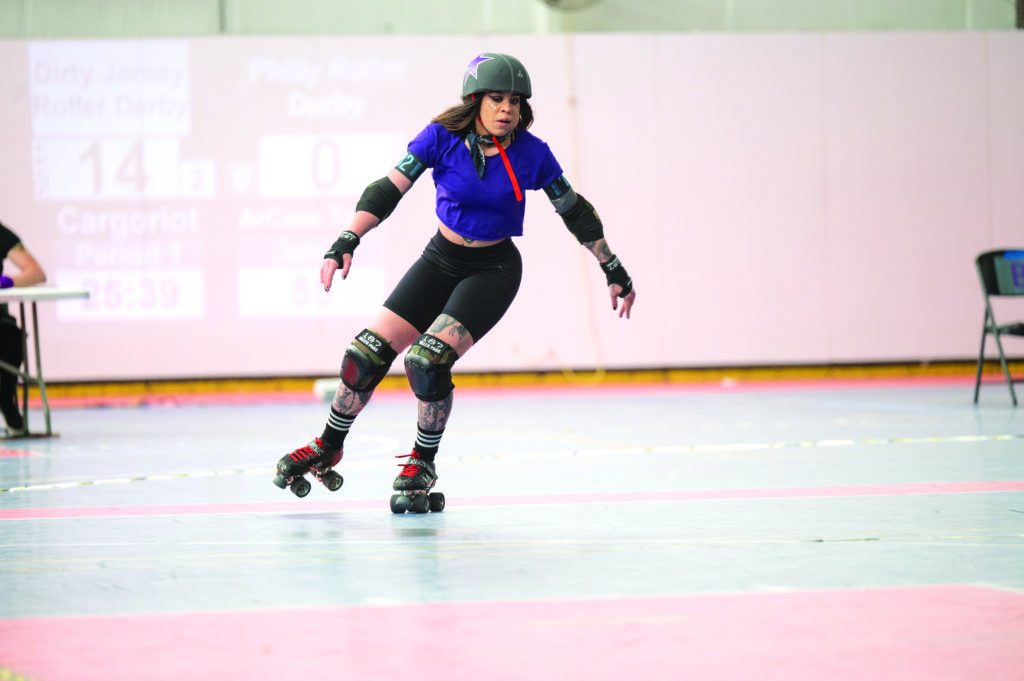
The DJRD season runs from September through June. It is more than the practices and the games that are played at their home base – the Sportsplex at Metuchen. The team gets involved in the community and gives back whether it’s a food pantry donation collection at games or rolling in various parades in Metuchen and surrounding communities.
Last year, the team participated in the Princeton Pride Parade. Part of the proceeds from T-shirts made went towards the Bayard Rustin Center for Social Justice in Princeton.
This year, a portion of ticket sales for their double header June 11 supported the Bayard Rustin Center for Social Justice in Princeton.
For more information about the Dirty Jersey Roller Derby visit them online at dirtyjerseyrollerderby.com or email dirtyjerseyrollerderby@gmail.com.

